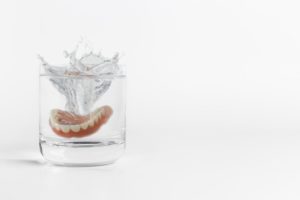
Dentures in Inwood Village have allowed you to comfortably speak, eat, and smile without worrying about people focusing on your missing teeth. However, it’s important to realize that they don’t last forever, especially when the shape of your mouth begins to change over time due to jawbone deterioration. If you have dentures and feel like they’re causing you trouble, look out for these six signs that they need to either be replaced or repaired.
Broken or Damaged
Whether your dentures have a small fracture, or a chunk of prosthetic tooth broken off, it’s important for you to take them to your dentist right away. Not only can these areas provide great hideouts for food particles, but they can harbor harmful oral bacteria that can put you at risk for developing gum disease. Large chips or cracks may also be sharp enough to irritate or hurt your soft oral tissues.
Difficulty Chewing
One of the main benefits and purposes of dentures is to allow you to do basic tasks, such as eating and speaking with ease. When you first get your dentures, you go through an adjustment period where you strengthen your cheek muscles, and this gradually gets easier. However, if you’re having difficulty chewing or speaking after you’ve had your restorations for some time, it could be a sign that your dentures need to be adjusted.
General Discomfort
Dentures will always be a foreign object in your mouth because they’re not home-grown by your body. But they should never be uncomfortable to wear. If you have jaw soreness, pressure, or general discomfort, be sure to address it with your dentist.
Gum Irritation
Once you adjust to the way your dentures feel in your mouth, you shouldn’t notice any gum irritation. If you have raw areas, inflammation, or bleeding, it could be a sign that your dentures are damaged. To combat these issues, keep up with your oral hygiene routine, including brushing your gums, tongue, and the roof and floor of your mouth twice each day and rinsing with antibacterial mouthwash.
Change in Fit
The longer your natural teeth are absent from your mouth, the more likely it is that you’ll notice your dentures don’t fit the same way they used to. This is because your jawbone will deteriorate, causing your facial shape to change, altering how your customized restorations fit in your mouth. If you notice slipping or shifting, it’s most likely a sign that your dentures need to be readjusted.
Oral Sores
Canker sores and raw patches of oral tissue can be a sign of fractures on the surface of your dentures. Although the damage may be small and unnoticeable, it’s important to get it repaired. Harmful oral bacteria and food particles can accumulate in these small spaces and cause infections to develop.
New Restoration Solution
If you’ve been informed that your dentures have seen their last day and you need new replacement teeth, be sure to ask your dentist about dental implants in Inwood Village. They’re a longer-lasting, more comfortable, and natural-looking solution that will eliminate these problems, meaning you’ll get to spend less time in your dentist’s office!
About the Author
Dr. Davina Prida earned her degree at Baylor College of Dentistry in Dallas, where she graduated with a Doctor of Dental Surgery (DDS). She is a member of the Dallas County Dental Society, Texas Dental Association, American Dental Association, and the American Academy of Cosmetic Dentistry. Dr. Prida is also a member of the Texas Army National Guard. One of her main focuses is creating beautiful Smiles. She ia a Top Dallas Dentist Providing High Quality Dental Care, General Dentistry, Cosmetic Dentistry, Dental Implants, and Reconstructive Dentistry. Dr Davina Prida is fulfilling her vision of bringing the very best in cosmetic dentistry, reconstructive dentistry and general dentistry to Dallas at Inwood Village Dental. Dr. Prida’s approach of dental excellence and her use of advanced techniques, create the most natural, beautiful smiles possible. Dr. Prida is Dallas’ top cosmetic dentist, creating amazing smile makeovers with veneers, dental implants, dental crowns and bridges and Invisalign®. If you have questions about your dental treatment or dental care options, don’t hesitate to contact her at Inwood Village Dental or at (214) 352-2777.
